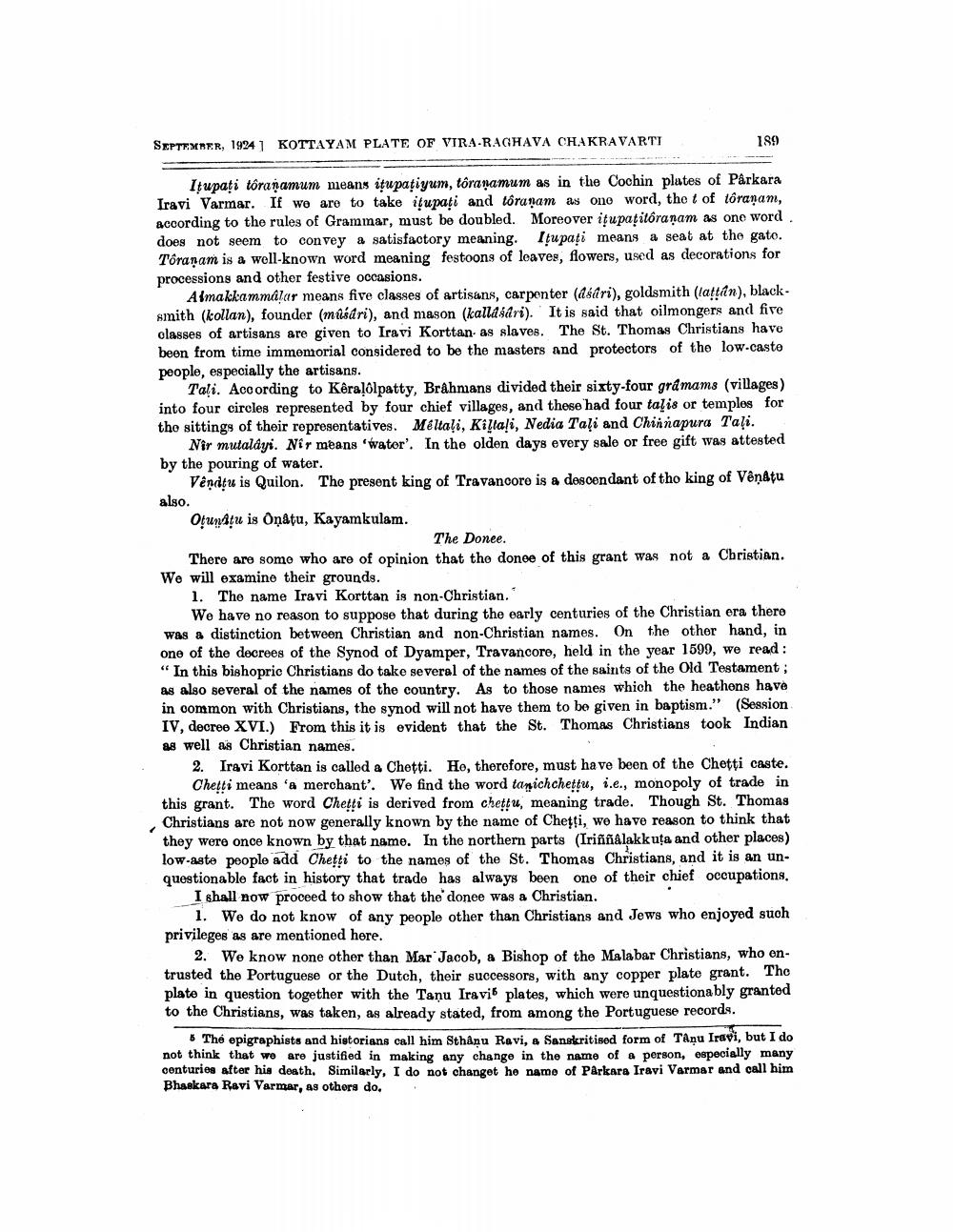________________
SEPTEMBER, 1924 1 KOTTAYAM PLATE OF VIRA-RAGHAVA CHAKRAVARTI
189
Itupati tóranamum means itupațiyum, tôranamum as in the Cochin plates of Parkara Iravi Varmar. If we are to take itupati and tôraram as one word, thot of tóraṇam, according to the rules of Grammar, must be doubled. Moreover itupaţitoranam as one word does not seem to convey a satisfactory meaning. Itupati means a seat at the gate. Tôranam is a well-known word meaning festoons of leaves, flowers, used as decorations for processions and other festive occasions.
Almakkammálar means five classes of artisans, carpenter (asari), goldsmith (lattan), blacksmith (kollan), founder (misari), and mason (kalldódri). It is said that oilmongers and fire olasses of artisans are given to Iravi Korttan as slaves. The St. Thomas Christians have been from time immemorial considered to be the masters and protectors of the low-caste people, especially the artisans.
Tali. According to Keralolpatty, Brahmans divided their sixty-four gramams (villages) into four circles represented by four chief villages, and these had four taļis or temples for the sittings of their representatives. Méltali, Killali, Nedia Tali and Chinnapura Tali.
Nir mutaláyi. Nir means 'wator'. In the olden days every sale or free gift was attested by the pouring of water.
Vêndtu is Quilon. The present king of Travancore is a descendant of tho king of Vênátu also. Otungtu is Oņâţu, Kayamkulam.
The Donee. There are some who are of opinion that the donee of this grant was not a Christian. We will examine their grounds.
1. The name Iravi Korttan is non-Christian.
We have no reason to suppose that during the early centuries of the Christian era there was a distinction between Christian and non-Christian names. On the other hand, in one of the decrees of the Synod of Dyamper, Travancore, held in the year 1599, we read: "In this bishopric Christians do take several of the names of the saints of the Old Testament ; as also several of the names of the country. As to those names which the heathens have in common with Christians, the synod will not have them to be given in baptism." (Session IV, decree XVI.) From this it is evident that the St. Thomas Christians took Indian 28 well as Christian names.
2. Iravi Korttan is called a Chetti. He, therefore, must have been of the Chetti caste.
Chetti means 'a merchant'. We find the word tanichchettu, i.e., monopoly of trade in this grant. The word Chetti is derived from chettu, meaning trade. Though St. Thomas Christians are not now generally known by the name of Chetti, we have reason to think that they were once known by that name. In the northern parts (IriññAlakkuta and other places) low-aste people add Chetti to the names of the St. Thomas Christians, and it is an unquestionable fact in history that trade has always been one of their chief occupations,
I shall now proceed to show that the donee was a Christian.
1. We do not know of any people other than Christians and Jews who enjoyed such privileges as are mentioned here.
2. We know none other than Mar Jacob, a Bishop of the Malabar Christians, who ontrusted the Portuguese or the Dutch, their successors, with any copper plate grant. The plate in question together with the Tanu Iravib plates, which were unquestionably granted to the Christians, was taken, as already stated, from among the Portuguese records.
6 Thé epigraphists and historians call him Sthånu Ravi, a Sanskritised form of Tanu Iravi, but I do not think that we are justified in making any change in the name of a person, ospecially many conturies after his death. Similarly, I do not changet he name of Parkara Iravi Varmar and call him Bhaskara Ravi Varmar, as others do.




